Terrorism trial highlights US deradicalisation effort
- Published
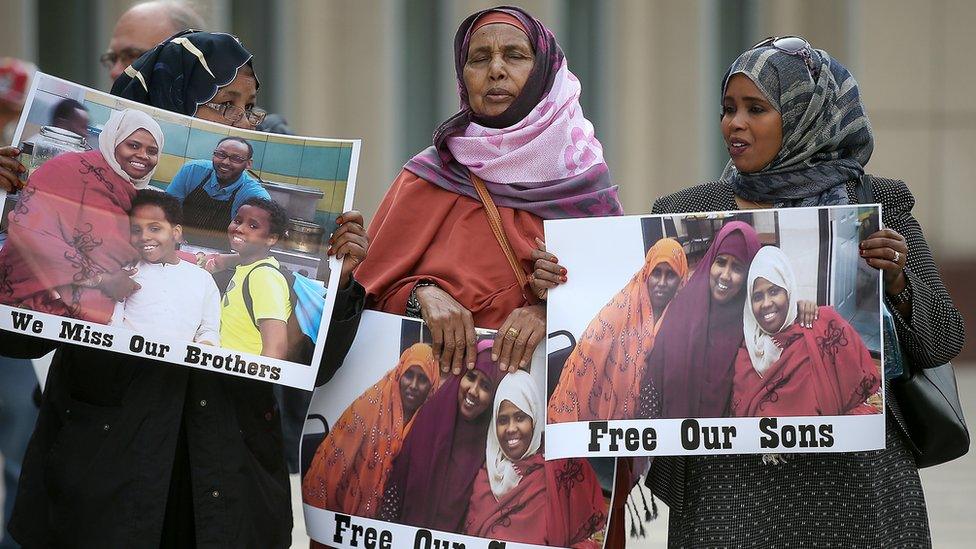
Family members and friends of the men on trial gathered outside the Minnesota courtroom
Authorities in the US claim fewer young people are leaving to join the Islamic State group in Iraq and Syria. Now they are trying to stop them becoming radicalised in the first place.
After listening to 17 days of intense testimony in a federal courtroom in Minneapolis, Minnesota, a jury entered deliberations on Wednesday.
They are weighing the evidence that three young Somali-Americans tried to join IS: Abdirahman Yasin Daud, 22; Guled Ali Omar, 21; and Mohamed Abdihamid Farah, 22.
The men have been charged with conspiracy to commit murder and could be sentenced to life in prison. They have pleaded not guilty.
One of the government's key witnesses against them was one of their friends - Abdullahi Yusuf, who pleaded guilty to conspiring to provide material support to IS in February 2015. In court, he described how the group became radicalised.
According to court documents, the men learned about the plight of Muslims in Syria and wanted to fight against President Bashar al-Assad.
In the meantime they played basketball, went shopping and watched IS videos.
Yusuf will be sentenced later. He could receive up to 15 years in prison.
In the meantime, US District Judge Michael Davis has sent Yusuf to a facility where he will be under heavy supervision and receive counselling rather than to a jail, apparently in recognition that he can still turn his life around.
It is part of a new effort at deradicalisation that is picking up steam in the US. The trial, says National Defense University's Kim Cragin, is "the perfect example" of this trend.
"You have a judge who's trying to find alternative means," says Cragin, who writes, external about violent extremism.
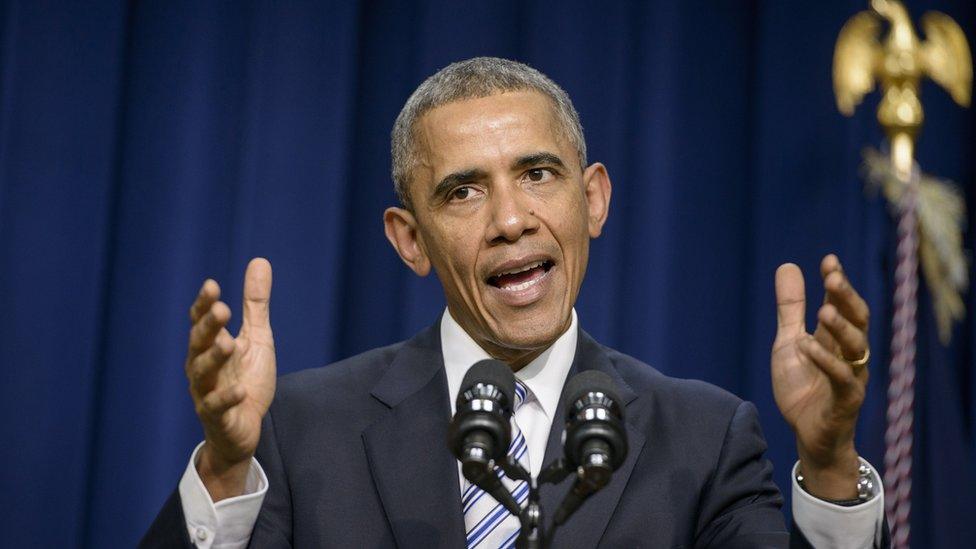
Obama, shown at a 2015 meeting on countering extremism, spoke about IS
In recent months, judges, social workers and others have become increasingly interested in the idea of deradicalisation. For those who are fighting against the radicalisation of Americans, there have been hopeful signs.
New data shows that the number of people from the US who have tried to go to the Middle East to join IS has gone down.
FBI Director James Comey recently told, external reporters that last year, his agents were seeing six to 10 Americans attempting to go to the Middle East to join the militant organisation each month.
These days the authorities are seeing only one American a month trying to go.
Globally, the number of people who are leaving home to join IS has gone down as well. At its peak IS attracted about 2,000 recruits from other countries in a single month.
Now, say US defence officials, about 500 foreigners join the militant organisation each month.
Several factors have contributed to the decline in foreign fighters. IS has lost a significant amount of territory, and as a result they are finding it harder to recruit people and pay wages.
In addition Turkish authorities have tightened their border controls, according to Cragin.
"The logistics of travel is harder," she says.

After losing Palmyra and other places, IS struggles with recruitment
It could also be that, simply put, IS is no longer as cool - at least to some. As the Center for Strategic and International Studies' Thomas Sanderson says: "The bloom is off the rose."
Still he says, "I would not bet on their demise anytime soon", describing the organisation as "still lethal but losing ground".
The number of people indicted by federal authorities either for going to Iraq and Syria to fight with IS - or trying to help others go there - has been relatively small: 10 or less per month, as Comey said.
Since February, as a forthcoming study from Center on National Security at the Fordham University School of Law shows, that number has also gone down.
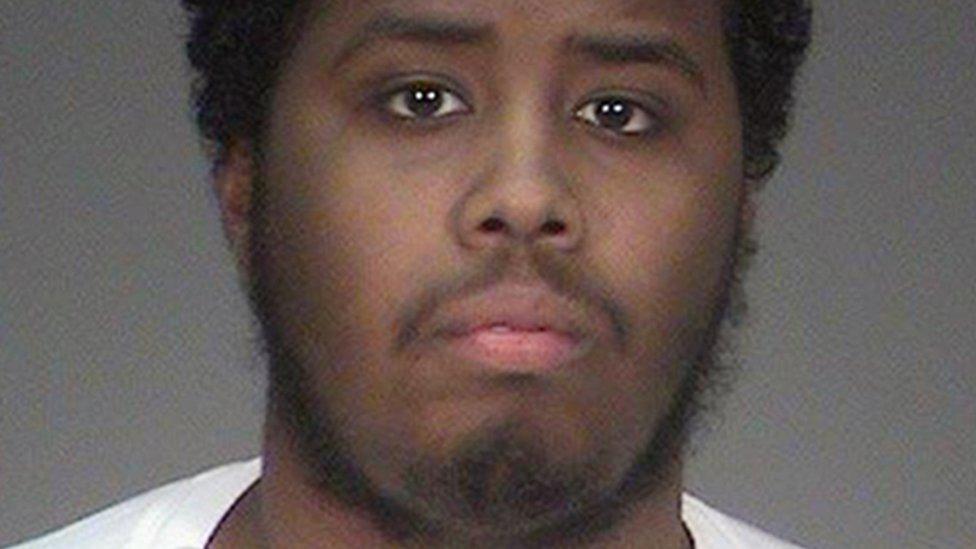
Mohamed Abdihamid Farah, 22, could be sentenced to life in prison
Meanwhile the number of people in the US who have shown support for IS - and may have planned an attack - has also been small: one to eight a month. However, over time this number has held steady.
For many young people, IS still maintains its allure, since the fight for them was never about land or money.
They are drawn to the IS ideology and its image. When talking about the organisation, Comey referred to "the attractiveness of the nightmare".
"Originally, many wanted to go abroad but they couldn't," says Karen Greenberg, the director of the Center on National Security at Fordham and the author of Rogue Justice: The Making of the Security State.
"Many turned their attention here."
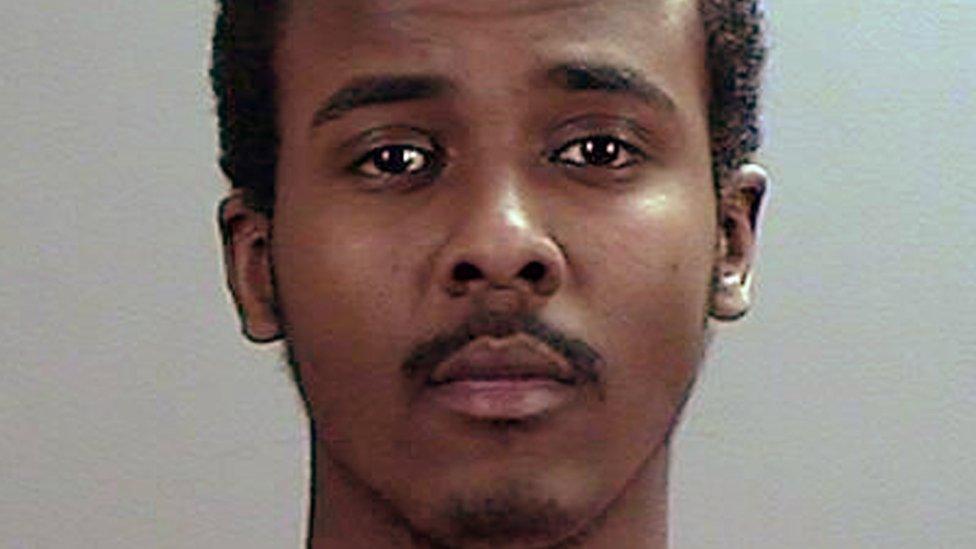
Abdirahman Yasin Daud, 22, has been put on trial for plotting to join IS
Law enforcement officials and policymakers have been trying to grapple with domestic radicalisation for some time.
They have a thousand cases, Comey says, in which they believe that an individual supports IS. Now authorities are trying to determine whether they are dangerous.
The people who support IS come from cities across the country, as a recent analysis, external shows. They are nearly all men - mostly in their 20s.
As Greenberg discovered through the centre's analysis of US cases, the most common age of those who turn to the militant organisation is 20 - a period of time when they have recently finished high school.
"That is an age when people are susceptible to this sort of movement," says Cragin. "It's not dissimilar from gangs, cults - even fraternities and sororities."
Putting these individuals in prison may make things worse. Behind bars, some become even more radical.
So the authorities are trying to come up with better ways to stop them from turning to extremist ideologies in the first place - or to give them an off ramp.

Guled Ali Omar, 21, was charged with conspiracy to commit murder
The Minneapolis trial draws attention to the government's effort to focus more on helping those before they actually go join the fight.
For many people in the Somali-American community, the trial is a reminder of how powerful - and destructive - extremist ideology can be.
Sadik Warfa, the executive director of Fagaaraha, a non-profit organisation devoted to Somali issues, has been attending the trial.
Describing how the accused mens' relatives look in the courtroom, he says: "Anguish is on their faces."
The jury's verdict is expected in a matter of days.
Updated on 3 June 2016: The jurors in the trial reached a guilty verdict for the three defendants.
- Published12 October 2017
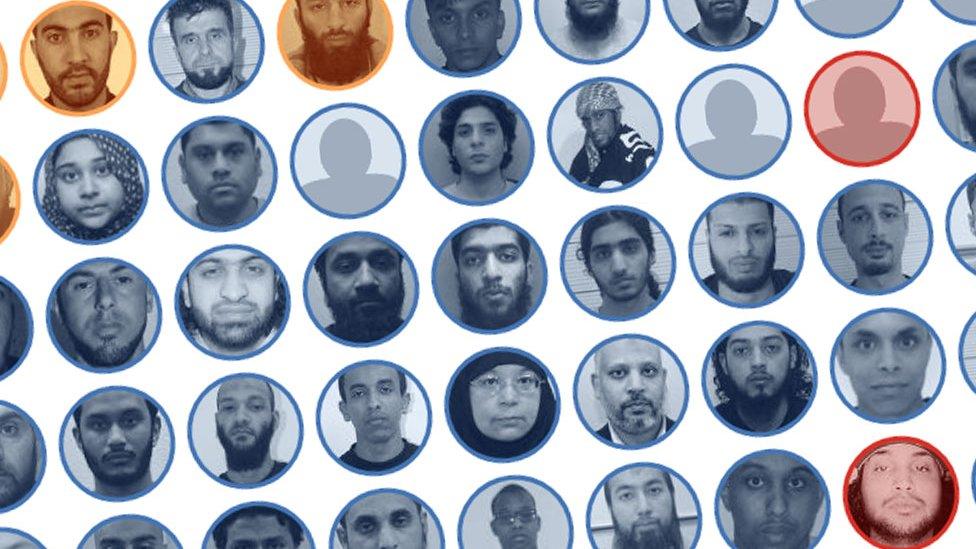
- Published28 March 2018

- Published3 September 2014
